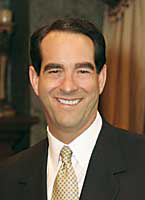 If you have ever hastily agreed to something without hashing out the finer details, you have entered into a legal agreement. Usually, these quick “I’ll do this if you do that” bargains go off without a hitch. However, complications sometimes arise. According to Brentwood business lawyer Brian T. Boyd, oral contracts often go south when one party changes their mind or when there are too many nuances to keep track of.
If you have ever hastily agreed to something without hashing out the finer details, you have entered into a legal agreement. Usually, these quick “I’ll do this if you do that” bargains go off without a hitch. However, complications sometimes arise. According to Brentwood business lawyer Brian T. Boyd, oral contracts often go south when one party changes their mind or when there are too many nuances to keep track of.
Recently, Boyd sat down with us to talk about the validity of oral contracts and whether or not they carried any weight in a court of law.
Q: What is an oral contract?
Brian T. Boyd: An oral contract is essentially a verbal agreement between two consenting parties. For example, when you make a trade with someone. Usually, there is no paperwork but you discuss swapping this for that. The swap happens, and everyone goes on with their day. You have completed the transaction and that’s the end of it.
Q: Can an oral contract be used to secure a larger agreement, such as leasing an apartment or selling a vehicle?
Brian T. Boyd: Yes and no. In the case of leasing property, as long as you own the property, you are within your rights to determine how you want to pursue a lease agreement. When you sell a vehicle, you must sign over the title, which serves as a legal document. Unfortunately, although you can attempt to sort out the details face-to-face, things can get sloppy in either one of these examples very quickly. We always suggest to residents and business owners in Brentwood that a business lawyer can draw up a contract that there is no question of intent.
Q: What happens when one party backs out of a verbal agreement?
Brian T. Boyd: That all depends on whether or not the oral contract can be proven. If there are witnesses, you likely have a legal standing should you pursue legal action. A Brentwood business lawyer can provide counsel based on specific circumstances.
Q: So, an oral agreement can not be enforced if there are no witnesses?
Brian T. Boyd: Not necessarily. Once you enter into an agreement, there are ways to prove the original intent. This starts by documenting your actions and those of the other party. Something as simple as sending an email or text message thanking them and letting them know that you have begun fulfilling the agreement can serve as proof.
Q: It has been said that Steve Jobs and Bill Gates entered into business deals with no more than a handshake. What are your thoughts on complicated business matters? Is a handshake enough?
Brian T. Boyd: Absolutely not. As a business lawyer in Brentwood, I have seen time and again these types of deals end in disaster for both parties. Jobs and Gates (and many other public figures) may have initiated agreements based on mutual respect and friendship, but you can guarantee their legal teams worked tirelessly in the background to ensure there were no misunderstandings.
Q: Do you need a business lawyer to draft an agreement?
Brian T. Boyd: Not necessarily, especially if it is a deal between friends or family members. However, it is highly advisable to do so in the case of employment contracts, real estate transactions, and other deals that have long-term implications, involve large sums of money or have stipulations that may not be clear.
For more information on oral contracts and other topics related to business law, business litigation, commercial law, and tax law, please reach out to The Office of Brian T. Boyd, PLLC at www.boydlegal.co. They are conveniently located in Brentwood, TN for all your legal needs.

